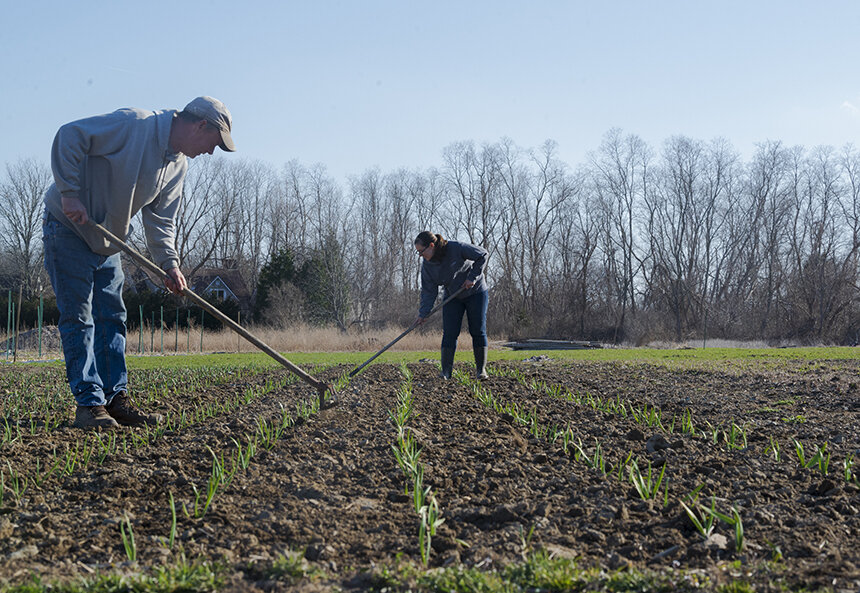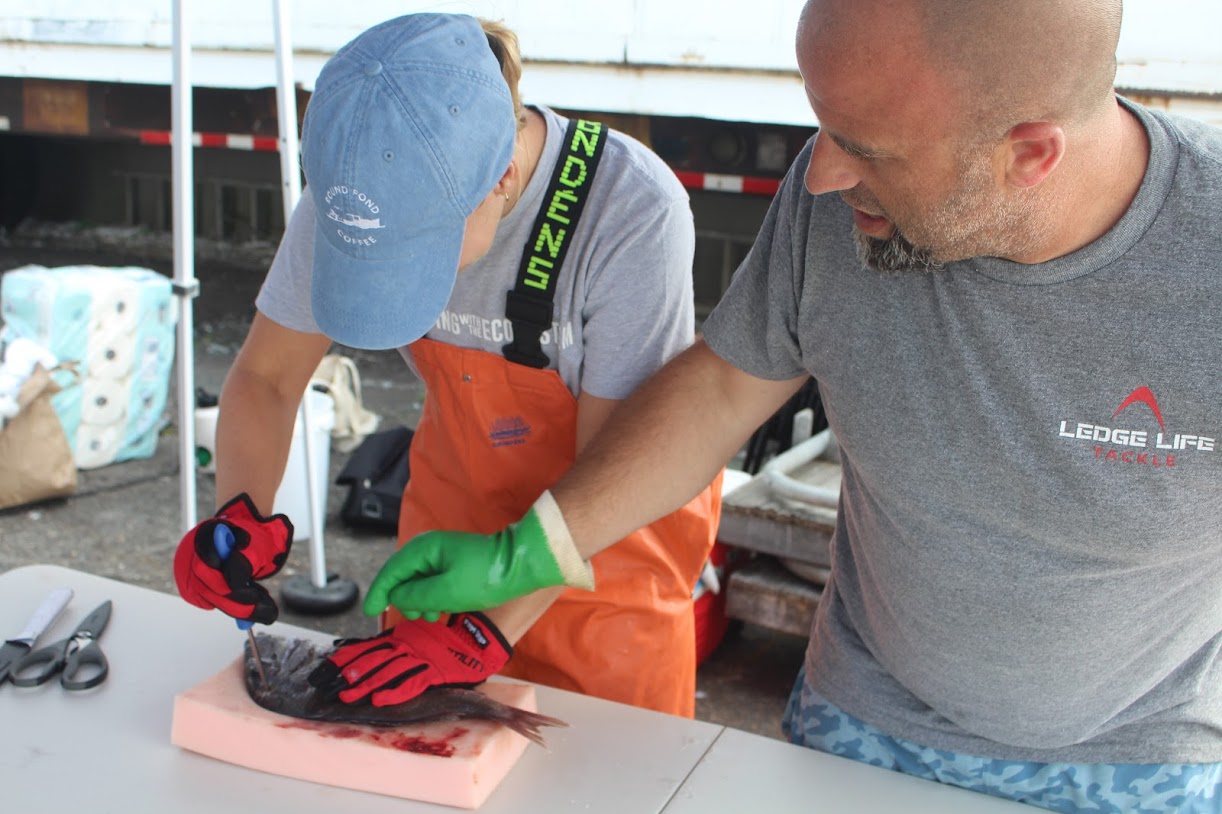What it Takes to be a Black Farmer: Continuing a Legacy and Combating Systemic Racism
August 13, 2020
Around the chicken coop, a farm is in resplendent bloom: yellow squashes sit fat beneath wide leaves; cucumbers poke through chicken wire; rows of tomatoes stand like sentinels beneath the plastic dome of the hoop house; beans dangle like wind chimes from the vine. In the middle of it all, Quatia Osorio unravels lines of drip tape, puncturing them and poking in a connector screw with an ease that belies the difficulty of the task.
“I’m making it up as I go,” she said, standing up to view her handiwork.
I’m here volunteering, work that involves wrangling prickly cucumbers, pulling up weeds, and keeping an eye out for hornets. It’s hard work, but the dirt that sticks under your fingernails is grounding and the conversation with Osorio carries us through the hours.
Here on Quaintly Farm on Chatham Street — and a few blocks away on her second plot, Journey Farm — Osorio is taking food justice and equity into her own green-thumbed hands.
Her journey to farm ownership began in 2017, when she attended an event coordinated by Urban FACTS, a local organization that hosts food and agricultural talks for Black, Indigenous, and People of Color Communities (BIPOC).
“They had this guy from the USDA [U.S. Department of Agriculture] speaking, and the presentation was about what it means to be a USDA-registered farm, what does the landscape look like in Rhode Island as far as Black farmers,” Osorio recalled. “During that meeting, at the time we found out that there were nine black farmers in the state. That number was so dismal, and it just was so frustrating and infuriating.”
That single-digit number is part of a larger, disturbing trend in the United States that has its roots in slavery and the oppression of Black people.

The story of farming in the United States — and in Rhode Island — was built on the forced labor and agricultural knowledge of Africans. It traces its bloody roots to what today are Ghana, Nigeria, Cameroon, Senegal, Gambia, and Guinea-Bissau. To Mali, Congo, the Democratic Republic of the Congo, and Gabon. To Charlestown, S.C., where women with rice woven into their hair were sold to plantation owners looking for forced labor and free farming knowledge. To Rhode Island, where slave-produced sugar and molasses were made into rum, and the money landed in white palms.
“It’s not like when they went to Africa, they just stole regular people,” Osorio said. “It took months of observation to figure out who were the best people to bring to this country so that when they were brought here, they could grow the agricultural industry.”
And these Africans, in return for their knowledge of growing rice, corn, potatoes, benne, and greens, were stripped of land and opportunity not just during their enslavement, but up to the present day.
In 1920, 14 percent of U.S. farm workers were Black, and they held 15 million acres of farmland. Today, a mere 1 percent of U.S. farmland is owned by Black farmers, and in Rhode Island, as of 2017, that number is even lower, at 0.7 percent, according to the latest Rhode Island Census of Agriculture.
So, when Osorio heard that single-digit number on that fateful day, it lit a fire in her.
“I had all these questions going through my head, like what constitutes a USDA commercial farmer? How did people get access to the land? And to unpack that you have to go through all the systematic racism, the land grabbing by white people, the government … all of that you have to unpack to get to where we are today,” she said. “And so just knowing what that history was, I was like what would it take for someone to become a Black farmer?”
Osorio decided to find out.
“I remember thinking, ‘Well, I could become a Black urban farmer,’” she said. “And now, here we are.”
She dove into learning about USDA rules and regulations, attended Leah Penniman’s Soul Fire Farm in Petersburg, N.Y., for training and, after returning, set out to prove that Black people farming and providing for their communities isn’t something new — and there’s no white savior necessary. (Penniman gave a presentation in Rhode Island in 2018 about discriminatory practices at farms that stem from centuries of institutionalized farming and discriminatory land-ownership practices.)
“People seem to think that urban farming is something new,” Osorio said. “But Black people have been having farms and growing for years. Everyone has a grandmother or aunt or uncle who has a garden. You know someone in your family who farms or who gardens.”
Osorio grew up on the city’s South Side, in a sort of urban Eden overflowing with grapevines and cherry trees.
“I’ve been a Providence resident all my life. We grew up with chickens and roosters in our neighborhood; we walked past houses that had large, large gardens growing all over their yards,” she said. “My Portuguese neighbor had grapevines flowing over the fences. We grew up in communities where you knew who had peach trees and who had cherry trees. Foraging in the community to eat was natural to us.”
Her family’s roots in agriculture go even deeper, touching back in time to the blood-soaked plantations of South Carolina.
“I am a direct descendant of slaves,” Osorio said. “My family genealogy starts down at the plantations, to the boat we came off in South Carolina. So just knowing that my history has always been tied to the land, it just felt natural. It wasn’t traumatizing, and I realized I didn’t have to feel like I was toiling and slaving under the sun for anyone.”
Quaintly Farm was born in 2018, birthed at the hands Osorio, who is also a doula, on land that she owns.
“I was intentional about growing on land that I owned in the inner city and making sure that it was connected to other communities of color,” she said. “I don’t need to go to the farmers market. … Why would I go anywhere other than where I’m already at to serve my people? And that was what I did. I set up shop and everything; did the farming; registered as a USDA-registered farmer, so that number could finally be in the double digits.”
One farm eventually grew to two, and today, Osorio sells grab bags of produce at reasonable prices to people in her community.
“Wow, look at these tomatoes!” a volunteer said as she walked over to join Osorio and me, as we prune the tomatoes’ fuzzy stems.
It’s a sunny Thursday morning on Journey Farm, and Osorio digs in the dirt with a spade, uprooting weeds and trimming plants.
“I know right! We’re just getting some of the extra tomato branches and plants up, one of my friends came the other day but felt bad pulling up the smaller plants,” Osorio said, laughing.
We quickly fall into a rhythm: weeding; talking about car troubles; giant sunflower plants; and odd bugs, and wiping the sweat off our brows.
“I just make it up as I go,” Osorio said. It’s become her motto of sorts, though as kale and cabbage and corn burst forth from the soil, it seems that Osorio was meant to do this work, weaving plant magic to nourish herself and her community.
“When I decided to farm, what I was doing was nourishing and restoring and rejuvenating myself, and through that, I was gonna grow vegetables that would then do the same thing for people in my community,” she said. “And that felt right, and that felt good.”




What a fantastic story. It’s so well written, and I learned so much from it. Thank you for sharing.
Farming While Black by Leah Penniman is an excellent book – anti-racism, history, gardening…highly recommend it!
Thanks for the article. Really appreciate you making farming and food production a racist issue. I’m a little unclear on whether you’re "woke" or "racist", since they so often believe the same things, especially that racial identity is the "most important thing". Martin Luther King, Jr. would be proud, I’m sure, that you’ve judged her not only on the content of her character, but especially on the color of her skin. Well done.
This story doesn’t make farming and food production a racist issue. White privilege did that centuries ago. This piece tells the story of farming through the eyes of a Black person. She shares her experiences, concerns, and triumphs. — Frank Carini, ecoRI News editor
Do the numbers not speak for themselves? Ignoring all other facets of the topic, Black people are disproportionately under-represented in the agricultural community. This is a systemic disadvantage; this is systemic racism. Isn’t this something we should examine and try to resolve?’
The sad reality is we haven’t achieved MLK’s vision for society. We live in a system where your race still defines people’s experiences. We can’t forget about the color of her skin, like you suggest, while the world is full of such disparities. To use the speech you quoted, MLK says, ‘I have a dream that one day on the red hills of Georgia, the sons of former slaves and the sons of former slave owners will be able to sit down together at the table of brotherhood.’ Black people need to be represented in the community, including the farming community, before we can achieve that.
Farming became a racist issue, when Africans were stolen from their country and make into slaves for free labor to build the agriculture industry. Unlike, those Europeans who were hired to become indentured servants and paid for their services. There are a multitude of books that can assist you with building this knowledge one is, From the folks who brought you the weekend and Black Food Geographies.
Dr. Martin Luther King, Jr. would be VERY PROUD, as both my character and the color of my skin. It is with pride that I elevate myself as a Black woman who farms intentionally to advocate for the awareness and dismantling of inequities in our food system. The character of compassion is one to behold. I leave with an equally familiar quote:
"Every man of humane convictions must decide on the protest that best suits his convictions, but we must all protest." ~Dr. King, Jr.
Becca j
Thank you, a compelling informative article.
I think Rick has a point. We need to remove all of those obstacles to black people getting into farming. Start with the laws making racism systemic. When you find some, let me know. In the meantime, the numbers don’t actually speak for the people, do they. If more black people wanted to be farmers, presumably more would. I’d be happy with more farmers. Who cares what color? Some people do, apparently.
Thank you for letting us know where you stand. You have added a lot to the community discussion. We’re all better for it. Don’t bother adding another comment, as it won’t be approved. You have already given us so much to think about. — Frank Carini, ecoRI News
Frank, did you really throw around "white privilege" in the EcoRI newsletter? You’re woke. Got it. But you know, I think I get enough preaching from the likes of Oprah Winfrey and Labron James telling me how racist America is, and how tough it is being a black billionaire in modern America. Probably don’t need it from you, too. It’s your paper, and you’re welcome to take it in any direction you want, but if you want anyone not buying into "woke-ness" to read it, you may want to consider a bit.
I don’t think anyone is "woke" recognizing and addressing the injustice, inequities, and issues within our collective communities. The are humane and informed, encouraging others to consider the lives lived beyond their own experience. The fact that billionaires, such as those you name, still share their own story of unjust issues should alert you to the overall problems that prevail regardless of their socioeconomic status.
Awesome work Quatia! Greening up the city and bringing meaningful work to our yards and neighborhoods is incredibly healing. Keep on going! We are sending you a pound of our coveted garlic seed to thank you for raising awareness. Love, Earth Care Farm
Thank you Jayne! I received it today! I am looking forward go growing it down at Journey Farm.
Thank you, Quatia, for sharing your story of vision, determination and hard work. So proud of you!
You’re welcome. Thank you for reading and support this necessary work.
Excellent – Great to meet you the other evening Miss Q – please let me know when I can bring you some composted cow manure from Cloverbud Ranch along with my grill and some of our grass-fed burgers.. If you want to organize a neighborhood work day I would be happy to provide the sustenance.. As far as the guy commenting that the article is inherently racist for pointing out your skin color he misses the point that people with your ethnic story arc were denied land ownership and had property stolen without legal recourse in a society with hatred and inequality at its core. The Great Migration moved many black communities off the land and stripped them of the healthful benefits of rural living. Communities of color often find themselves in urban food deserts where investment lags behind and social / health problems are apparent to anyone who is paying attention. We are aware of our privilege that has enabled us to enter the local food space and want to share our energy, opportunities and networking connections with hardworking people like my friend "Miss Q" and find our way out of patterns of inequality that tend to keep people separated..